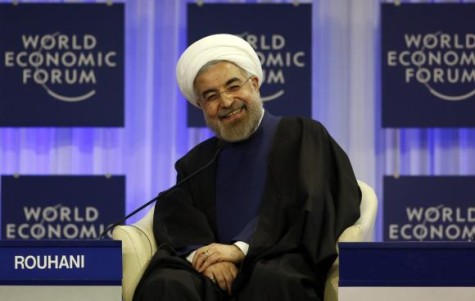President Rouhani (pictured) has continued Iran’s PR campaign on the nuclear issue this morning, two days before talks on a comprehensive agreement resume with the 5+1 Powers (US, Britain, France, Germany, China, and Russia).
Rouhani said that he hoped for a settlement by July 20, when an interim Joint Plan of Agreement expires. However, restating Iran’s fundamental demands, he said the interim arrangement could be extended as discussions continue.
#Iran prez Rouhani:Still possible to reach deal by July 20th. Iran will continue to have enrichment. In any agrmnt, sanctions must be lifted
— Abas Aslani (@abasinfo) June 14, 2014
#Iran prez Rouhani: The best option is to reach agreement in remaining 5 weeks. If no deal, we won't lose.
— Abas Aslani (@abasinfo) June 14, 2014
The President’s statement follows an appeal by Foreign Minister Mohammad Javad Zarif to the US, through his contribution to The Washington Post:
It would be tragically shortsighted if illusions were to again derail progress toward a historic achievement. There will be no better time to put an end to the unnecessary nuclear crisis than now, when all sides have much to gain and before the window of cooperation and pragmatic reason closes.
Zarif tried to dispel the claim that Iran will maintain a “breakout” capability in which it can produce a nuclear weapon within two months:
If Iran ever wanted to break out, all IAEA (International Atomic Energy Agency) inspectors would have to be expelled from the country. Iran’s program would then have to be reconfigured to make weapons-grade fissile material, which would have to be converted to metal, be molded into the shape required for a bomb and undergo countless other complex weaponization processes. None of these capabilities exist in Iran and would have to be developed from scratch. This would take several years — not a few months.
The “several years” line was also in an official Iranian report published this week.
In addition to the messages, Tehran has signalled its willingness for compromise. Senior officials said that the Arak heavy-water nuclear reactor, due on-line at the end of 2014, can be redesigned to alleviate US-European worries about plutonium by-product. The officials said the plutonium, which could be used in a militarized nuclear program, will be reduced by 80%.
At the same time, Iran has maintained its fundamental demands in talks: recognition of its right to enrich uranium to 5%, maintenance and expansion of centrifuges for enrichment, and lifting of US-led sanctions.
The centrifuges issue appears to be the most substantial one to be resolved with the 5+1 Powers. Iran is insisting that it should not only maintain its stock of 19,000 centrifuges but develop and expand them; the US and European allies say the number must be reduced significantly.
The Supreme Leader’s top aide, Ali Abkar Velayati, struck a tough pose on Friday: “The Islamic Republic of Iran will never be influenced by pressure exerted by others who seek to deprive Iran of its nuclear rights and will never back down from its rights.”
Rouhani’s conclusion?
#Iran prez Rouhani: They (P5+1) need agreement more than Iran. We see deal as win-win.
— Abas Aslani (@abasinfo) June 14, 2014

